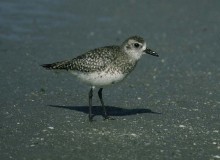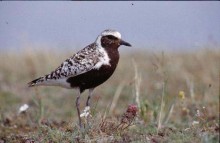Pluvialis squatarola
Subspecies
None
Other Names
Black-bellied Plover, Grey Sandpiper
Identification
Large, big headed, long legged grey coloured Plover with a short bill.
Plumage
Non-breeding: The upperparts have a mottled appearance because of the grey-brown feathers are edged with white. The tertials and wing-coverts are also grey-brown but the feathers are notched with white giving a speckled look. The chin, throat, sides of the neck and the breast are white blotched with grey-brown. The bill is black, short with a bulge on the tip. Legs grey.
Breeding: Striking black, white and grey plumage. The supercilium, sides of neckand breast are white, contrasting with the black of the lores, ear, throat, breast and belly
Juvenile: Similar to adult but upperparts are more heavily spotted.
Distribution
Found all around Australia, though less common on the eastern coast. It is almost entirely a coastal bird, feeding on the mud flats and roosting on sandy beaches; with very few observed elsewhere. Also, does not seem to like the areas the Pacific Golden Plover frequents.
Migratory habits
From its breeding grounds north of 65°N the Grey Plover migrates over a vast area to South America, Africa, southern Asia and east Asia.
Breeding
Breeds north of the 65°N parallel in the tundra from western Russia east through Siberia into Alaska across Canada to Baffin Island.
Status
Australian population is about 12,000 birds.
East Asian-Australasian Flyway Population: about 125,000.
Nearly all Grey Plover in Australia are female.
Confusing Species
Bar-tailed Godwit: Similar patterning on its back and its size might give some confusion, but if the bill is visible there is no confusion.
Pacific Golden Plover: The golden colouration and smaller size make for easy identification, but the overall jizz of the bird can give rise to confusion..


